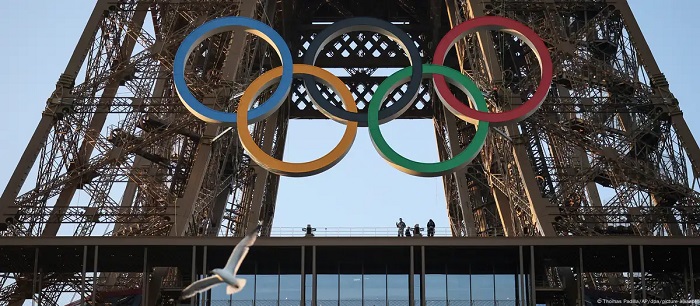
How many athletes are taking part?
Around 10,500 athletes from 206 nations will be competing at the Olympic Games. For 19 days, from July 26 to August 11, they will be competing for a place on the podium in 32 different sports. A total of 329 gold medals will be up for grabs.
One of the big stars of these Summer Games promises to be American gymnast Simone Byles, the four-time Olympic champion who struggled with mental health problems at the Games in Tokyo three years ago. In athletics, Kenya's marathon star Eliud Kipchoge is aiming to become the first to win Olympic gold at three consecutive Games.
The eyes of the sporting world will also be on the USA basketball team. With LeBron James, Steph Curry and Kevin Durant, three of the world's basketball elite will be competing in Paris. Footballer Kylian Mbappe, on the other hand, will not be there. The French superstar has not received clearance from his new club, Real Madrid.
As a result of Russia's full-scale invasion of Ukraine, the involvement of athletes from Russia and Belarus is limited. Only individual athletes determined to have no connection to the Russian army or security forces have been cleared to compete under a neutral flag. Both countries have been excluded from competing in team sports.
How many spectators are expected? Are tickets still available?
The organizers are expecting 15 million visitors. Nevertheless, tickets for individual events are still available via the official ticket outlet. Tickets for football are the cheapest, with prices starting at €15($16.35). If you want to watch events such as swimming or gymnastics, you will probably have to fork out over €100 as only tickets in the upper price categories remain. The opening ceremony is the most expensive, with the cheapest ticket going for €1,600 (as of July 12).
Where will the competitions be held?
There are 35 venues, not all of them in Paris. The modern pentathlon and the equestrian competitions will be held in front of the Palace of Versailles. The football tournament will be played in stadiums all over the country, while handball takes centre stage in Lille. Surfers will be competing off the coast of Tahiti in the Pacific Ocean.
However, most of the disciplines will be held in the heart of the French capital. The beach volleyball players will be competing within eyeshot of the Eiffel Tower.
The opening ceremony will not take place in a stadium, as is usually the case; instead, it will feature the athletes floating down the Seine on 160 boats.
It is still not entirely certain whether the open water competitions and the triathlon swim will be held on the Seine as planned. The reason: for a long time, the water was too contaminated with pathogens. Two weeks before the start of the Games, the city of Paris cautiously gave the all-clear. A spokesman for the city say it had determined that the water had been clean enough to safely host swimming competitions on "11 or 10" of the past 12 days.
Which sports are new?
Sports are added to or excluded from the Olympics every four years. Skateboarding, sport climbing and three-on-three basketball made their debuts at the last Summer Games in Tokyo.
In Paris, "breaking," also known as breakdancing, will be included for the first time. Dancers will be judged on their ability to improvise a dance to a previously unknown beat. Also new to the Games in Paris will be kayak cross. However, baseball, softball and karate and the 50-kilometer walk have been dropped.
How safe are the Games expected to be?
Tens of thousands of police and army personnel will be on duty every day – in addition to private security personnel. In an effort to recruit enough personnel, the government shortened training to three weeks from five, introduced bonuses and retrained staff from other sectors.
Visitors and residents need QR codes to get through police barriers. Traffic is being restricted and some subway stations are being closed completely.
AI-controlled camera systems will also be in use. They are designed to detect unusual movements of crowds and weapons. The software is not to be used for facial recognition.
Major events such as the Olympic Games are potential targets for terrorist attacks. French authorities know this all too well, and the country has been the scene of a number of acts of terrorism in recent years, such as the deadly attacks on Charlie Hebdo or the Bataclan.
The government has already reduced the spectator contingent for the particularly exposed opening ceremony. For a long time, the idea of switching to another venue was considered. However, it now looks as if the ceremony will be held on the Seine after all.